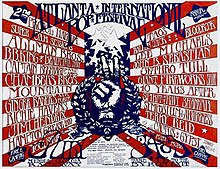Atlanta International Pop Festival (1970)
| Atlanta International Pop Festival | |
|---|---|

Promotional poster for the event. Design by Lance Bragg.
|
|
| Genre | Rock, pop, etc. |
| Dates | July 3–5, 1970 |
| Location(s) | United States |
| Years active | 1970 |
| Founded by | Alex Cooley |
The second Atlanta International Pop Festival was a rock festival held in a soybean field adjacent to the Middle Georgia Raceway in Byron, Georgia, from July 3–5, 1970, although it did not finish until near dawn on the 6th. It was the only successor to the first Atlanta Pop Festival, which had been held the previous summer near Hampton, Georgia. The event was promoted by Alex Cooley, who had helped organize the '69 Atlanta festival as well as the '69 Texas International Pop Festival, and two years later would promote the Mar Y Sol Pop Festival in Puerto Rico from April 1-3, 1972.
Like 1969's , the event was promoted as "three days of peace, love and music." Tickets for the festival were priced at $14. Also like Woodstock, it became a free event when the promoters threw open the gates after large crowds outside chanting "Free, free, free. Music belongs to the people" threatened to overwhelm even the biker security crew the promoters had hired. Crowd estimates for the festival varied widely at the time, and still do, ranging from 200,000 to 600,000.
Construction crews worked at the festival site for over a month prior to the event’s opening day building the main stage, two spotlight towers atop soaring tree-trunk tripods, an eight-foot tall plywood fence surrounding the entire 24-acre audience seating area, and other facilities. A separate, much smaller stage – the “Free Stage” - was also built some distance away in a wooded camping area to accommodate impromptu performances by mostly local Georgia musicians who wanted to play during the festival, and many did - including The Allman Brothers Band. During the construction phase, the band Wet Willie performed for the construction crew but did not perform during the festival itself. The festival sound system was supplied by Hanley Sound of Medford, Massachusetts, and a rear-projection light show was provided by The Electric Collage of Atlanta, both of which had provided similar services at the first Atlanta Pop Festival the previous summer.
Temperatures at the festival were sweltering, surpassing 100 degrees Fahrenheit every day. Nudity and drug use were widespread, but local law enforcement officials, who knew they were vastly outnumbered, stayed outside the festival gates and employed a general ‘hands-off’ policy towards most festival-goers during the event’s duration. However, Georgia’s colorful governor, Lester Maddox, who had tried repeatedly to prevent the festival from taking place, vowed that he would do whatever it took to block any similar event in the future. The state legislature willingly complied and enacted sufficient restrictions to make it much more difficult for anyone to organize another rock festival in the state. Like Atlanta's Ramblin' Raft Race, the gathering was, to some extent, the victim of its own success. A third Atlanta Pop Festival never took place.
...
Wikipedia
